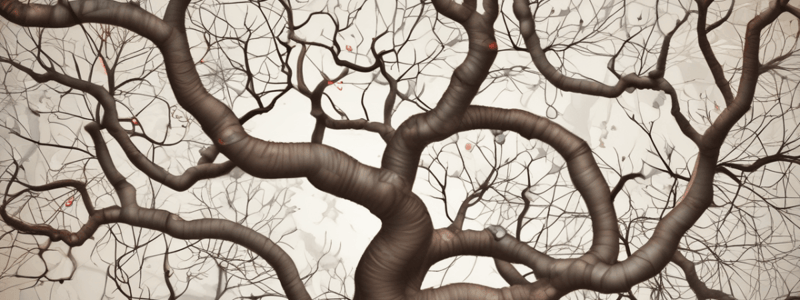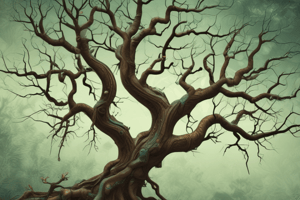Podcast
Questions and Answers
What is the study of the interactions between organisms and their environment?
What is the study of the interactions between organisms and their environment?
- Microbiology
- Genetics
- Botany
- Ecology (correct)
Which branch of biology studies the structure, function, and interactions of biological molecules?
Which branch of biology studies the structure, function, and interactions of biological molecules?
- Microbiology
- Biophysics
- Genetics
- Biochemistry (correct)
What is the process by which cells divide to produce new cells?
What is the process by which cells divide to produce new cells?
- Meiosis
- Photosynthesis
- Respiration
- Mitosis (correct)
Which of the following is an example of an ecosystem service?
Which of the following is an example of an ecosystem service?
What is the study of the structure, growth, evolution, classification, and distribution of plants?
What is the study of the structure, growth, evolution, classification, and distribution of plants?
Which of the following is a mechanism of evolution?
Which of the following is a mechanism of evolution?
What is the study of the chemical processes that occur within living organisms?
What is the study of the chemical processes that occur within living organisms?
Which of the following is an example of a cellular process?
Which of the following is an example of a cellular process?
Flashcards are hidden until you start studying
Study Notes
Branches of Biology
- Botany: study of plants, including their structure, growth, evolution, classification, and distribution
- Zoology: study of animals, including their structure, growth, evolution, classification, and distribution
- Microbiology: study of microorganisms, such as bacteria, viruses, and protists
- Ecology: study of the interactions between organisms and their environment
- Genetics: study of heredity, genes, and genetic variation
- Biochemistry: study of the chemical processes that occur within living organisms
- Biophysics: study of the physical principles underlying biological processes
- Molecular Biology: study of the structure, function, and interactions of biological molecules
Cell Biology
- Cell Structure: cellular components, including cell membrane, cytoplasm, and organelles
- Cellular Processes: metabolic processes, such as photosynthesis, respiration, and cell signaling
- Cell Division: mitosis and meiosis, including stages and importance
Evolution
- Theory of Evolution: gradual changes in species over time through natural selection and genetic drift
- Mechanisms of Evolution: mutation, gene flow, genetic drift, and natural selection
- Evidence for Evolution: fossil record, comparative anatomy, and molecular biology
Genetics
- Mendelian Genetics: laws of inheritance, including segregation, independent assortment, and dominance
- Genetic Variation: sources of genetic variation, including mutation, genetic recombination, and gene flow
- Genetic Expression: transcription, translation, and regulation of gene expression
Ecology
- Ecosystems: interactions between biotic and abiotic components, including energy flow and nutrient cycling
- Population Ecology: population growth, structure, and dynamics
- Community Ecology: interactions between different species, including predation, competition, and symbiosis
- Ecosystem Services: importance of ecosystems for human well-being, including provisioning, regulating, and cultural services
Branches of Biology
- Botany studies plant structure, growth, evolution, classification, and distribution
- Zoology studies animal structure, growth, evolution, classification, and distribution
- Microbiology studies microorganisms like bacteria, viruses, and protists
- Ecology studies interactions between organisms and their environment
- Genetics studies heredity, genes, and genetic variation
- Biochemistry studies chemical processes within living organisms
- Biophysics studies physical principles underlying biological processes
- Molecular Biology studies structure, function, and interactions of biological molecules
Cell Biology
Cell Structure
- Cellular components include cell membrane, cytoplasm, and organelles
Cellular Processes
- Metabolic processes include photosynthesis, respiration, and cell signaling
Cell Division
- Mitosis and meiosis involve stages and are important for life
Evolution
Theory of Evolution
- Gradual changes in species occur over time through natural selection and genetic drift
Mechanisms of Evolution
- Mutation, gene flow, genetic drift, and natural selection drive evolution
Evidence for Evolution
- Fossil record, comparative anatomy, and molecular biology support evolution
Genetics
Mendelian Genetics
- Laws of inheritance include segregation, independent assortment, and dominance
Genetic Variation
- Sources of genetic variation include mutation, genetic recombination, and gene flow
Genetic Expression
- Transcription, translation, and regulation of gene expression occur
Ecology
Ecosystems
- Interactions between biotic and abiotic components involve energy flow and nutrient cycling
Population Ecology
- Population growth, structure, and dynamics are studied
Community Ecology
- Interactions between species include predation, competition, and symbiosis
Ecosystem Services
- Ecosystems provide provisioning, regulating, and cultural services important for human well-being
Studying That Suits You
Use AI to generate personalized quizzes and flashcards to suit your learning preferences.




